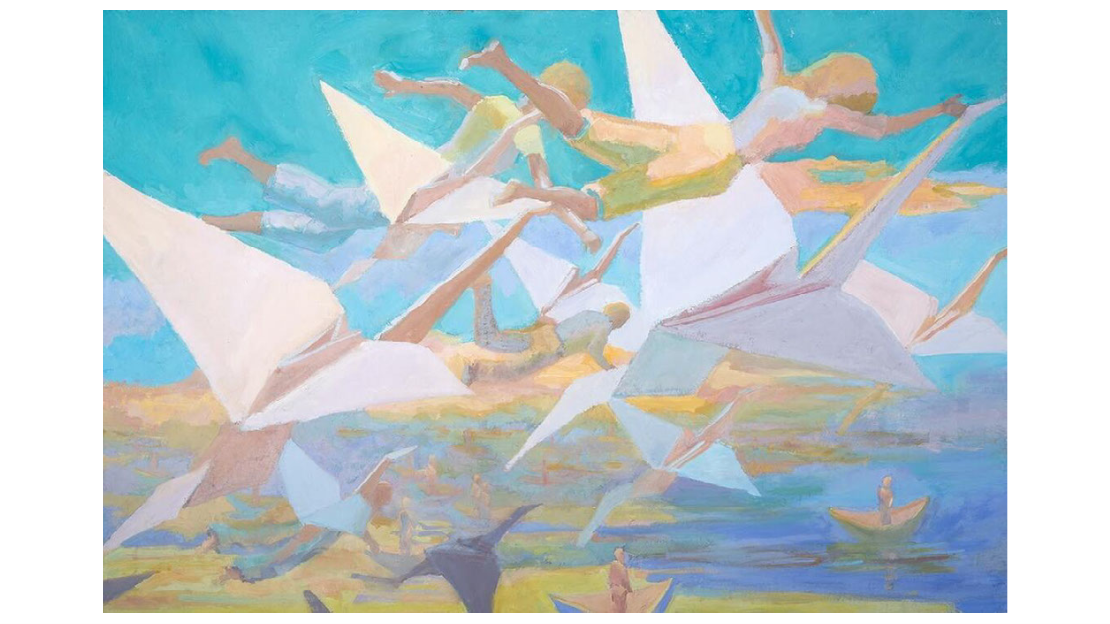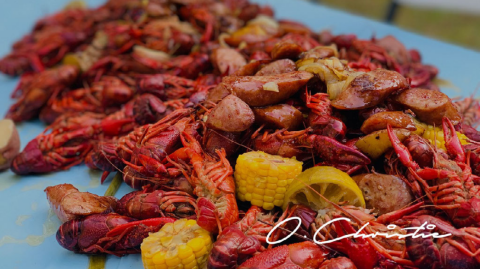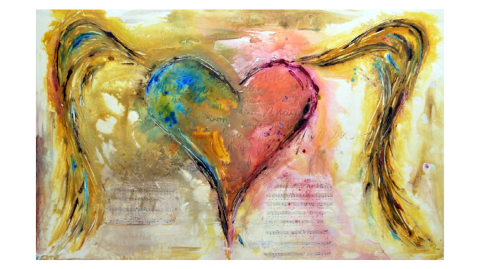"Learning To Fly" artwork by Mindy Flexor (2017)
A fatal attraction is holding me fast…How can I escape this irresistible grasp?
--Pink Floyd
I’m learning to fly, but I ain’t got wings…
--Tom Petty
Are you so slow? Do you need to be shown that faith without actions has no value at all?
--James 2:20 (CEB)
Dear Friends,
I am inspired this week by the echoes of a recent Sunday school discussion here at Fairhope United Methodist Church. I was not directly involved in the class session, but delighted nonetheless to know that it was happening. The challenge of ‘getting together’ in these days leaves me all the more grateful for these glimpses of determined discipleship.
The topic (or so I have heard) was the often debated understanding of the role of faith and works as found in the New Testament epistles. I enjoyed my friend’s recap of the lesson: we were sure that we had it all figured out, that is, until we started to actually engage the material! It sounds to me like it was a great class. I do celebrate the opportunity to worship, live, and serve as part of a thinking church.
Beyond our historic deliberations over the work of grace versus the law, perhaps there is something to be said for surrendering our certainty just long enough to open the door to new understanding (of course, even as I write it, that last statement sounds absolutely ridiculous to my natural being). Wait…what am I saying?
Are we not proud of all that we have already learned? We certainly are! But when and how do we decide to stop (learning, that is)? How consumed are we by the fear of what will happen to our world if we ever relinquish our most ironclad convictions? And how aware are we of what is lost if we do not? And where does this leave us on the grid of Christian community, where our personal coordinates are somewhere between the axes of love God and love neighbor?
If it is any consolation, I am likely just as annoyed by these questions as you are—for the simple reason that they make me think! Thus, I shall now turn gladly to the benefit of a third part consult.
Among his many writings, Soren Kierkegaard composed a marvelous parable that speaks well, I believe, to this investigation of the interior soul:
“A certain flock of geese lived together in a barnyard with high walls around it. Because the corn was good and the barnyard was secure, these geese would never take a risk. One day a philosopher goose came among them. He was a very good philosopher and every week they listened quietly and attentively to his learned discourses.
‘My fellow travelers on the way of life,’ he would say, ‘can you seriously imagine that this barnyard, with great high walls around it, is all there is to existence? I tell you, there is another and a greater world outside, a world of which we are only dimly aware. Our forefathers knew of this outside world. For did they not stretch their wings and fly across the trackless wastes of desert and ocean, of green valley and wooded hill? But alas, here we remain in this barnyard, our wings folded and tucked into our sides, as we are content to puddle in the mud, never lifting our eyes to the heavens which should be our home.’
The geese thought this was very fine lecturing. ‘How poetical,’ they thought. ‘How profoundly existential. What a flawless summary of the mystery of existence.’ Often the philosopher spoke of the advantages of flight, calling on the geese to be what they were. After all, they had wings, he pointed out. What were wings for, but to fly with? Often he reflected on the beauty and the wonder of life outside the barnyard, and the freedom of the skies.
And every week the geese were uplifted, inspired, moved by the philosopher’s message. They hung on his every word. They devoted hours, weeks, months to a thoroughgoing analysis and critical evaluation of his doctrines. They produced learned treatises on the ethical and spiritual implications of flight. All this they did. But one thing they never did. They did not fly! For the corn was good, and the barnyard was secure!”
As the story so wisely conveys, there are terrible limits to living our lives only in theory. If true wisdom is the goal—or in other words, the maturity of the mind of Christ—then is it fair to say that any of us have arrived? This in itself would be a tremendous leap of faith!
They say that ‘knowledge is power.’ Maybe so, but how bound are we, I wonder, by what we are sure that we already know?
So consider the walls of your barnyard. How high are they--really? Do you remember that you were created to fly? Is it time to put those wings to good use?
How much is that good old corn really worth to you? What might it cost you in the end?
Teach us, Lord, that the fear of the Lord is the beginning of wisdom. Everything else is fair game, and thus up for discussion. Help us to think and let think. And since we’re still learning here, we ask that you give us the courage to fly over, the humility to fly under, and the strength to fly through, come what may. In the name of the One who still directs the winds to obey…Father, Son, and Holy Spirit, AMEN.
Grace to You,
Darren




